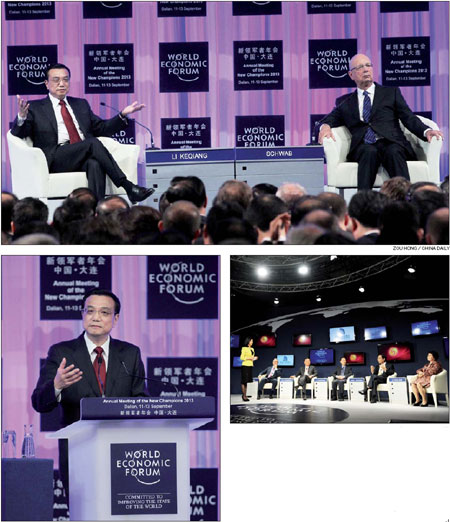Li stresses transformation of economy
Updated: 2013-09-13 10:03
By Ding Qingfen, Chen jia and Fu Jing (China Daily)
|
|||||||||||
Premier confident structural change will lead to sustainable and healthy growth
China must push forward economic transformation and structural reform to achieve sustainable and healthy growth, Premier Li Keqiang said on Wednesday.
"Without structural transformation and upgrading, we will not be able to sustain economic growth in the long term," Li said.
His comments came in a keynote speech at the opening ceremony of the World Economic Forum Annual Meeting of the New Champions 2013, or "Summer Davos", in Dalian, Liaoning province.
China's economy has shown signs of stabilizing in recent months after a growth slowdown, signaled by larger-than-expected rebounds in trade, and surveys showing manufacturing regaining momentum.
The government has shown a willingness to tolerate slower growth for reform initiatives.
A series of measures have been introduced in recent months to stabilize the economy, including large-scale targeted investment in railways and public housing construction and policies to help smaller companies in need of financing.
"The economy is fundamentally stable, and the trend is positive," Li said.
As long as the major economic indexes are in a reasonable range, the macroeconomic policies will remain fundamentally stable, focusing on transformation of the economic growth and adjustment of the economic structure, he said.
"Looking forward, China's development has a bright future. China has full capability and the conditions to maintain sustainable and healthy growth in the long term."
The government has set the full-year's GDP growth target at 7.5 percent with inflation at less than 3.5 percent.
Li said that expanding domestic consumption, especially in services, will be a key part of the economic transformation, and balancing regional development and narrowing the gap between urban and rural areas will be a major task.
As part of efforts to push the transformation, China will foster new growth areas in domestic consumption, investing in sectors such as new energy, urban infrastructure and railways in central and western areas and promoting growth in services including health, culture and education, he said.
While reiterating that the country will achieve the main growth targets this year, Li also warned that the fundamentals for China's economic recovery are still fragile.
"The potential growth is set to slow down ... China's future growth must be based on improvement of quality and efficiency," he said.
He pledged to improve the investment climate and create an environment in which all players have equal access to production and legal protection.
Liu Yuanchun, associate dean of the School of Economics at Renmin University of China, said the premier's speech signals his determination to deepen structural reform.
"The policy of Premier Li has been consistent, emphasizing restructuring, promoting transformation and stabilizing growth," Liu said.
"This is the right choice, when compared with stimulus investment or easing monetary policy."
Wang Tao, chief economist in China at UBS, said the nation should not worry about short-term growth, as the rebound will continue. She forecast that the economy will grow by 7.6 percent this year.
In August, industrial output grew at its fastest pace for 17 months at 10.4 percent from a year earlier, compared with 9.7 percent in July.
Fixed-asset investment accelerated to a 20.3 percent expansion year-on-year in the first eight months compared with 20.1 percent from January to July.
Retail sales of consumer goods grew by 13.4 percent from a year earlier, up from 13.2 percent in July, reaching the highest level since March, the National Bureau of Statistics said.
With improvements in exports and the manufacturing Purchasing Managers' Index, all macroeconomic data have confirmed China's economic growth has picked up solidly, economists said.
"More growth potential will be released through urbanization and industrialization," Wang from UBS said. "But in the long run, the government will face pressure from production overcapacity and the increase in non-performing loans."
Nancy McKinstry, chief executive officer of Wolters Kluwer in the Netherlands, a publisher and global information services company, said the driving forces behind China's long-term growth will come from several areas.
She said the government has decided to focus on upgrading industries and moving beyond manufacturing by boosting the role of consumption and the service industry, which will release "tremendous" opportunities.
Contact the writers through
dingqingfen@chinadaily.com.cn
|
Clockwise from top: Premier Li Keqiang and Klaus Schwab, founder and executive chairman of the World Economic Forum, address the opening ceremony of the Summer Davos; A group of guest speakers talk about how to build a new image for China; Li delivers the keynote speech during the opening ceremony. Pan Yulong / Xinhua, Zou Hong / China Daily |
(China Daily European Weekly 09/13/2013 page4)
Today's Top News
List of approved GM food clarified
ID checks for express deliveries in Guangdong
Govt to expand elderly care
University asks freshmen to sign suicide disclaimer
Tibet gears up for new climbing season
Media asked to promote Sino-Indian ties
Shots fired at Washington Navy Yard
Minimum growth rate set at 7%
Hot Topics
Lunar probe , China growth forecasts, Emission rules get tougher, China seen through 'colored lens', International board,
Editor's Picks

|

|

|

|

|

|






